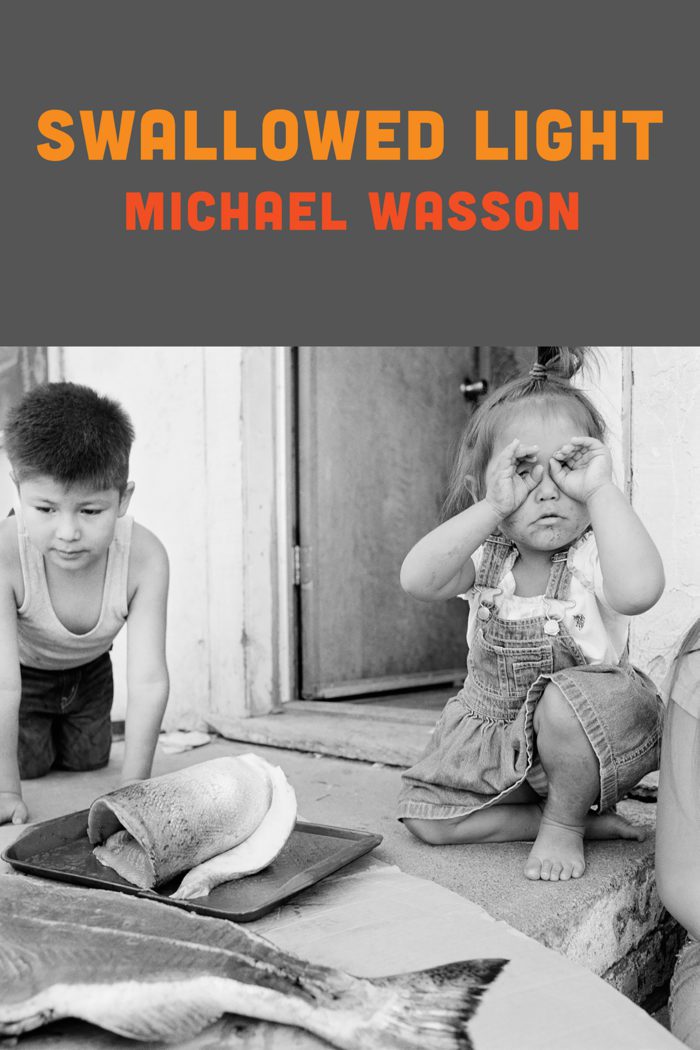
Swallowed Light begins at the opened clearing of myth, at the mouth of history. In his breathtaking debut poetry collection, Michael Wasson writes into the gaps left by a legacy of erasure—the wholly American fracture of colonialism—where the indigenous tongue is determined to bloom against its own vanishing. These poems mourn and build with pattern and intricacy, intuition and echo, calling ocean and heartbreak and basalt, monsters and bullets and bones, until they form one vibrant song.
ISBN: 9781556596001
Format: Paperback
Reviews
“This collection draws its shape around holes and tunnels, the vulnerability of feeling overcome, the legacy of violence, and the honesty required for truly stating one’s feelings. . . . Shaped out of contemplation, mourning, and a desire for renewal, these poem carefully build as they consider their subjects. One poem instructs, ‘Carve the wind apart/ into one single/ lasting answer,’ which serves as a motif for the poet’s own lyric exploration of light, boyhood, and nimipuutímt language and storytelling. A late poem ends with ascendancy, having ‘let my last/ eye open.’ These deeply felt pages offer a bold tapestry of imagery and thought.”—Publishers Weekly
“Wasson knows that there are holes that cannot be filled by even the most fervent words of any language . . . [He] conveys viscerally and eloquently—and with seemingly infinite compassion—the intimate legacies of this genocidal empire.” —The Adroit Journal
“For all the pain of this collection, these poems are full of breath, of light. They open outward, they invite the reader in, they fill the dark corners of history with a tender gaze.” —Southeast Review
“With this release, Copper Canyon Press has raised further into the light these remarkable poems by Michael Wasson. The earth has never been still. It has reverberated with the losses it has absorbed. Through his poems, Wasson has unearthed the buried bones of generations and brought their lives into the daylight. This is the work of a poet, and the importance of such work can never be underestimated.” —New York Journal of Books
“Wasson’s lyrical verse seems to turn over and over again, like a marble on the tongue, this idea of lost language, serving up to the reader different iterations of how language is related to culture, family, freedom, and the body.” —West Trade Review
“Many of Wasson’s exquisite poems hold the bones of his ancestors, which hold a different weight, reflect a different energy. Wasson, who is nimíipuu from the Nez Perce Reservation in Lenore, Idaho, writes about the people and the land shattered by colonialism. That is: the fractures that separated children from their parents, severed the living from their lives, and scattered the bones of ancestors far from their communities.” —Broadsides to Books
“Tinged with mourning, Michael Wasson’s Swallowed Light deals in folklore, history, and the preservation of a vanishing language. These poems are riddled with ghosts and bones, bullets and colonization, and the space between the dead and the living. They are also woven with nimiipuu stories like that of the Ant and the Yellowjacket as well as Biblical references. As I read Swallowed Light, I was reminded of Marie Howe’s famous last line, ‘I am living. I remember you.'” —West Branch
“Sometimes a collection of poems reads like a beautiful field guide. This is true of Michael Wasson’s latest collection, Swallowed Light, which not only includes beautiful images wrought in careful lines, but also helps us understand who we are by understanding the history of where we are. We need poems as guides and reminders. We need poems that help us see and resee. And we need poets like Michael Wasson to help us do both. Swallowed Light proves once again that Indigenous voices are essential to understanding the complexity of land through its history, the culture that still lives in it, and the language born of it.” —ISLE
“Michael Wasson’s poetry collection, This American Ghost, is both visceral and lyrical, taking its reader on a passionate, painful journey of decolonization . . . [This work] makes clear that personal tragedies are intricately connected to realms beyond our individual experiences—to our cultures, our nations, our natural world.” —Transmotion
